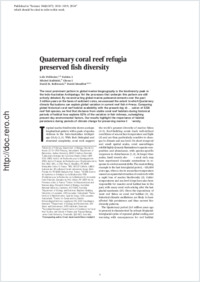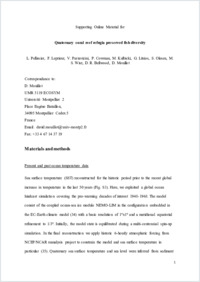Quaternary coral reef refugia preserved fish diversity
Université de Fribourg
- Pellissier, Loïc University of Fribourg, Department of Biology, Switzerland - Department of Bioscience, Aarhus University, Denmark
- Leprieur, Fabien Laboratoire Ecologie des Systèmes Marins Côtiers, Montpellier, France
- Parravicini, Valeriano Corail, Laboratoire Arago, Banyuls/mer, France - Fondation pour la Recherche sur la Biodiversité, Aix-en-Provence, France
- Cowman, Peter F. Centre for Macroevolution and Macroecology, Research School of Biology, Australian National University, Canberra, Australia
- Kulbicki, Michel Corail, Laboratoire Arago, Banyuls/mer, France
- Litsios, Glenn Department of Ecology and Evolution, University of Lausanne, Switzerland - Swiss Institute of Bioinformatics, Lausanne, Switzerland
- Olsen, Steffen M. Center for Ocean and Ice, Danish Meteorological Institute, Copenhagen, Denmark
- Wisz, Mary S. Department of Bioscience, Aarhus University, Denmark - Department of Ecology and Environment, Hørsholm, Denmark
- Bellwood, David R. Australian Research Council Centre of Excellence for Coral Reef Studies, James Cook University, Townsville, Australia
- Mouillot, David Laboratoire Ecologie des Systèmes Marins Côtiers, Montpellier, France - Australian Research Council Centre of Excellence for Coral Reef Studies, James Cook University, Townsville, Australia
-
30.05.2014
Published in:
- Science. - 2014, vol. 344, no. 6187, p. 1016–1019
English
The most prominent pattern in global marine biogeography is the biodiversity peak in the Indo-Australian Archipelago. Yet the processes that underpin this pattern are still actively debated. By reconstructing global marine paleoenvironments over the past 3 million years on the basis of sediment cores, we assessed the extent to which Quaternary climate fluctuations can explain global variation in current reef fish richness. Comparing global historical coral reef habitat availability with the present-day distribution of 6316 reef fish species, we find that distance from stable coral reef habitats during historical periods of habitat loss explains 62% of the variation in fish richness, outweighing present-day environmental factors. Our results highlight the importance of habitat persistence during periods of climate change for preserving marine biodiversity.
- Faculty
- Faculté des sciences et de médecine
- Department
- Département de Biologie
- Language
-
- English
- Classification
- Biological sciences
- License
- License undefined
- Identifiers
-
- RERO DOC 211372
- DOI 10.1126/science.1249853
- Persistent URL
- https://folia.unifr.ch/global/documents/303848
Other files
Statistics
Document views: 61
File downloads:
- pel_qcr.pdf: 107
- pel_qcr_sm2.txt: 18
- pel_qcr_sm1.pdf: 67


